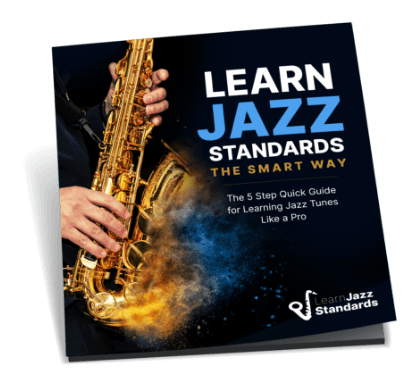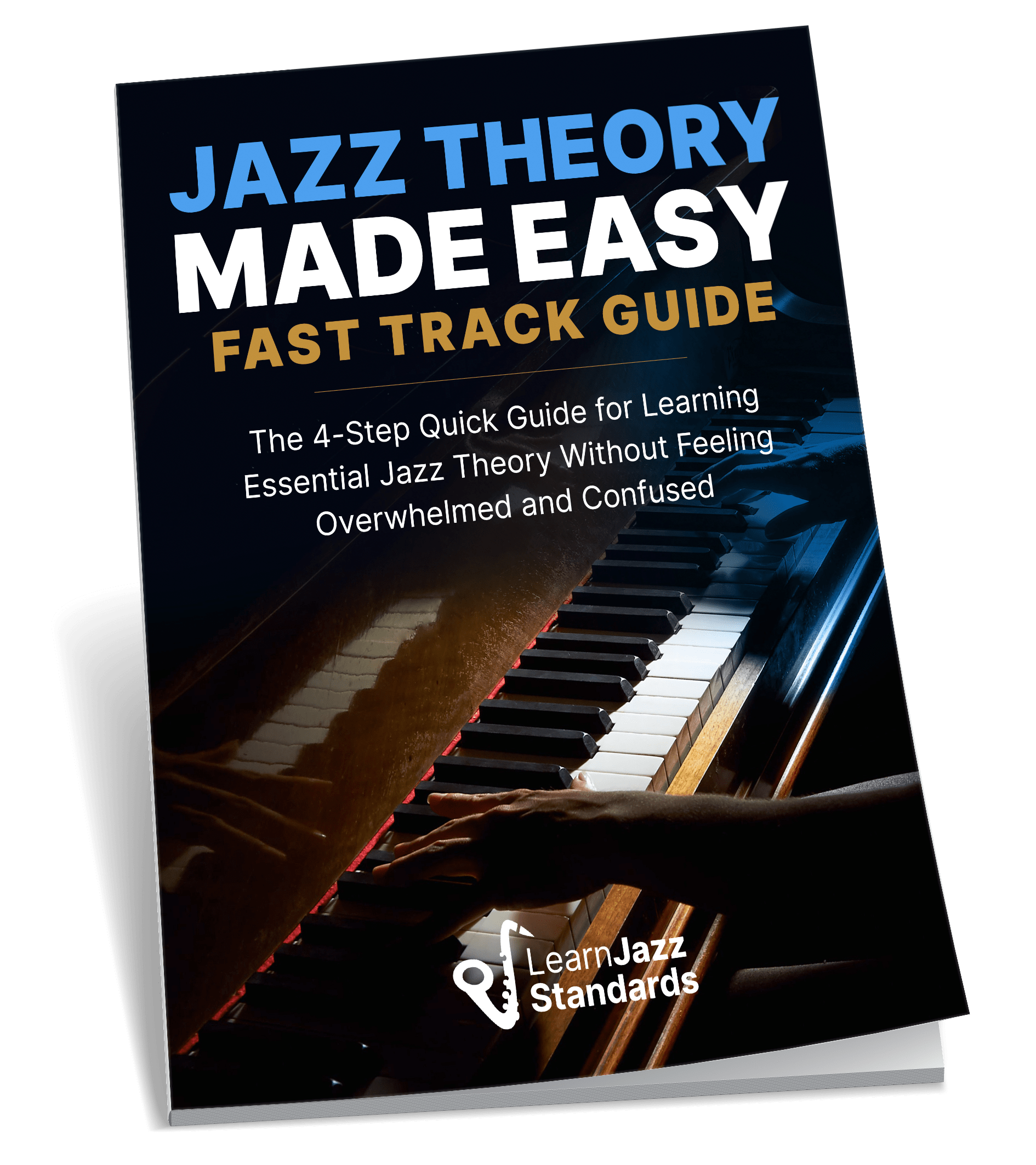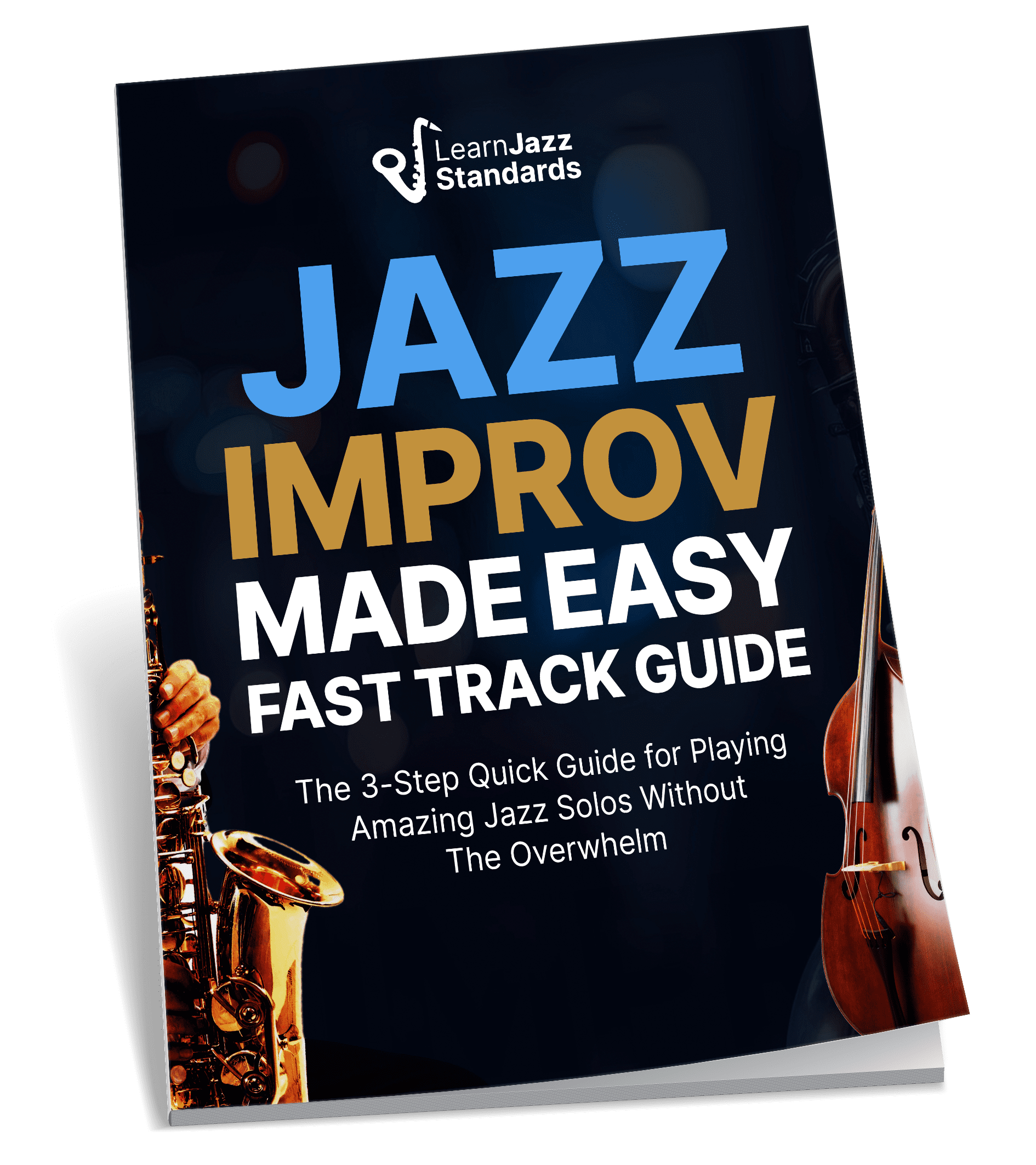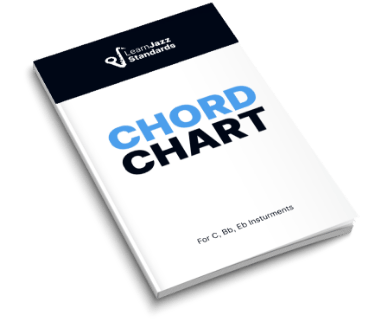Welcome to episode 103 of the LJS Podcast where today we are having podcast listener Gabriel from Fishers, Indiana on the show to share his jazz tips and advice. Gabriel talks about a moment of musical failure, how he learned from it and has been crushing it in the practice room ever since. Specifically, he hones in on the difference between play along and actually knowing tunes. Listen in!
Listen to episode 103
I’m excited to bring on today’s episode another awesome listener of the LJS Podcast to share his jazz tips and advice with all of you. This month we have been celebrating the 2 year birthday of the podcast, and to help celebrate, we are highlighting you the listeners, the ones who make this podcast happen!
On episode 104 we will have a bunch of listeners on the show, but for this episode we are honing in on one submission that’s a little bit longer and has a great lesson to teach us, worth spending an episode on.
Gabriel from Fishers, Indiana talks about his musical journey, how a musical failure turned into a ton of improvement in the practice room, and how important it is to know tunes on a deep level.
Here are some main takeaways from Gabriel’s talk:
1. The difference between play along and playing a jazz tune.
2. Why you need to know all of the parts of a tune.
3. Why practicing along with recordings is such a beneficial practice.
I want to thank Gabriel for his great advice and sharing with all of us his knowledge. Let’s all take Gabriel’s example and enthusiasm so we can improve on the weaker areas of our musicianship.
Important Links
Free Guide to learn standards by ear: Learn Jazz Standards the Smart Way
Read the Transcript
Brent: Hey, hey. What’s up everybody? My name is Brent. I am the jazz musician behind the website, learnjazzstandards.com, which is a blog and a podcast all geared towards helping you become a better jazz musician. Now, welcome to this very special bonus episode of the week. Now, it’s not really a bonus episode. If you’re listening outside of realtime in the future, this is really just episode 103, but it’s bonus because this episode is coming out on a Thursday, which means it’s the second episode of the week. We come out with episodes every Monday, and this time we’re doing one on Thursday because next week we’re gonna be doing our big episode 104 — really excited about that. But on episode 103, we are having a very special guest on the show just like we did last week. We had a listener of this show who had previously submitted a recording of their story, their jazz advice with us. We have another one of those examples today, which I’m really excited about, really excited to hear from these. I’ve just been really enjoying all of these.
And in next week’s episode, 104, we’re having a bunch of you on to give tons of your advice and tips, and it’s just really awesome. But today, I have a listener who submitted a recording that offered … a little bit of a longer recording that had some very specific things that I think are important for us to talk about and dedicate an episode to.
So, I’m excited to introduce you to that guest, so hold on. We’re gonna get there really soon. Now, if you’ve been listening, you know that this is our podcast birthday month. Next week we are celebrating two years of the LJS Podcast, of it being around. Now, of course our blog and all of our other stuff, our website, has been going on for much longer than that, but this is tow years of the podcast, so we want to celebrate it, and to do that we are doing our birthday month podcast raffle. Now, for the raffle we’re giving away our jazz eCourses, our eBooks and even some our backing tracks to a bunch of different people who submit raffle entries.
The raffle entries are really simple to do. There’s stuff that really take no time at all, like submitting a kind rating and review on iTunes, joining our mailing list if you haven’t done that yet, sharing our 100th episode on Facebook, all kinds of different things that can earn you more raffle entries. The great thing about all this stuff is it just really helps support our podcast, and it’s a free way for you to do it, and you also possibly win something from it too, so it’s a win-win situation. So, if you’d like to go participate in our raffle, go to learnjazzstandards.com/raffle, learnjazzstandards.com/raffle, and you can get in on that. Really excited to have you do that. All right, now without further ado, let’s get into today’s show.
Now, like I said, today’s guest is a listener just like you, sharing his advice, his story. The reason I love guests like this is because I really do believe in the power of story and how it can teach us so much from just listening to each other and learning from each other. I know I personally have been learning so much from listening to everybody who’s sent in recordings, and I’m just really thankful for everybody who has done that. I just really appreciate it. Now, our guest today, his name is Gabriel. He’s from Fishers, Indiana. He is a pianist and a drummer, and he’s got some great stuff to share with us today. So, I’ll let Gabriel take it away.
Gabriel: What’s up everybody? My name is Gabriel Glover. I’m a drummer and pianist from just north of Indianapolis, Indiana — Fishers, Indiana. So, I play drums and I play piano. I’ve actually played piano a lot longer than I have drums. I’ve been playing since I was about five, but when it comes to jazz I really focused in on my jazz drumming since I was in about the fifth or sixth grade. In recent years, I’ve actually devoted some time to figuring out jazz theory and how it relates to piano, how it relates to some classical stuff that I already knew. I’ve actually found out that even though I’m a drummer, when I play piano and focus on understanding tunes from a piano context, I actually drum a lot better, so that’s something kind of interesting that I found in my own playing.
When it comes to this podcast, Learn Jazz Standards, I’ve been listening for about a year on and off, and I first found out about this website when I was in kind of a rough spot practicing and I was looking online for developing better practice strategies. I’ve been playing music for so long, even though I’m only 17, but I realized that when I was younger I didn’t have the best discipline. So, I found the Learn Jazz Standards practice guide and I read through it. I was like, “Well,” … Well, actually I skimmed the beginning of it, and I was like, “Well, maybe this’ll help.” So, I printed it off and I took about 15 minutes and read through the whole thing. I think that 15 minutes helped at least the next 16 … excuse me, at least the next six months of my practice because it really gave me a very structured speed boost to how I needed to go back to the practice room.
Now, I’ve taken that influence and then what I’ve also developed, things I need to fix, things I need to change, and that’s kind of gotten me to where I am now. So, if you were to ask me to pick a favorite jazz musician, I would actually give you a dynamic duo. It’s got to be Elvin Jones and McCoy Tyner. The recordings that they did together were just wonderful, and as a drummer I love Elvin’s playing, and as a pianist, I mean, McCoy Tyner, the way that he voiced things, the way that he basically just contributed to, I don’t know, all of jazz history … it’s very powerful. If I was to choose a favorite album, it’s actually going to be a more modern album, “Trilogy”. It’s from 2014. For those who haven’t heard, it’s Christian McBride, Chick Corea and Brian Blade. I would say that Brian Blade is one of my favorite modern drummers. He resembles Elvin Jones in a lot of ways coincidentally. But that album is just very … I mean, it’s just artistically beautiful. You have so many different styles being explored.
So, yeah, those are kind of my tastes in that way. If I was to give two things to the Learn Jazz Standards community that I think would be beneficial from my own experience and from what I’m seeing that I’m trying to kind of organize for my future as a young musician, I would first talk about what I am doing in the practice room right now, which is focusing on tunes. Tunes are very important. I’ve realized that kind of like I said in the past couple of years as a pianist, but especially lately as a drummer. The truth is I feel confident in my swing time, my feel, my soloing, whatever, but sometimes if you don’t know the tune you’re not gonna be able to play. In that Learn Jazz Standards practice guide, there was a very helpful piece of advice that talked about letting the tunes teach you. So, I would encourage listeners from what I have experienced that being a drummer, you could go to a jam session and you could get lucky if they call, you know, I don’t know, something simple like Blue Monk or Blue Bossa, anything like that.
You could get lucky and get away with appearing like you know how to accompany a group. You might even solo. They give you a solo, and you just play some textbook rudimental stuff, some expressive stuff, whatever you can do, and you can get away with it and walk out of there and you’re like, “Boom. I’ve played jazz.” But the truth is that I’ve found out that … when I’m in the practice room, there is a huge difference between me playing along with a song and playing a song. For me, actually playing a tune, voicing it on the drums, what I do is this … I do three things. I try to accompany it, to swing along, and I’ll even maybe have a recording where a soloist is playing over the tune and I’ll try to play with them like I would in real life. So, I’ll try to accompany it. The second is that I’ll try to trade fours in my head over the form. It makes me keep track of the form. The third thing I’ll do is try to voice the melody on the drums.
So, being a drummer, being any kind of instrumentalist, when you quote the melody repeatedly when then you add your own fundamentals over the melody, it just makes you look like you know what you’re doing. So, in the practice room that’s really what I’m focusing on. That kind of comes out of a story of what I would say failure is. A story of failure for me. But it ended up being a story of success ’cause it’s put me in a different mindset. I was at a Jamey Aebersold camp probably six or seven months ago, and in my audition they asked me, “What tunes do you know?” I was sitting at the drum set. They’re like, “What tunes do you know?” I’m like, “Well,” … I was thinking. I was like, “I mean, I know about a lot of jazz tunes. I like to think that I could play along,” ’cause I’m a drummer. I’m like … So, I literally asked them, I said, “Well, what does it really mean to know a tune as a drummer?”
And that was kind of awkward ’cause they looked at me like I was pretty stupid, and I realized as I was sitting there, I’m like, “Well, do they want me to comp or do they want me to play it on the snare?” And so they kind of had to explain it to me like I was a three-year-old, which was uncomfortable, but I ended up … I think I ended up playing Billy’s Bounce, and it was fine ’cause I genuinely did know that recording. But that basically jump-started me into trying to do what I am now in the practice room, which is basically memorizing and learning a hundred tunes, and then I have a hundred more in the list coming up that I’m just gonna learn those too and be able to play through all of them, comp through all of them. That’s the kind of thing that makes me a comfortable musician.
So, I would just encourage people in the jazz community … we have to keep this art alive. There’s nothing like jazz when it comes to self-expression, improvisation. In the past year, I’ve seen that tunes are basically the foundation of that; knowing the music that you want to play is the foundation of that. So, Gabriel Glover. I’m from Fishers, Indiana, just north of Indianapolis. Thanks for all you guys are doing; appreciate it. Keep playing.
Brent: Well, Gabriel, I just want to thank you so much for submitting a recording and just for giving so much value and sharing your story, and the lessons that you’re learning, and the stuff that you’re working on because I think all that stuff is things that we can all be doing, and we could all be focusing on as well. To hear your story of failure and just to be vulnerable with that, I really appreciate that. Just thanks again for taking the time to do this. Now, for those listening, at the beginning of his talk he was talking about the practice guide. It’s called The Ultimate Jazz Guide to Practicing, and I think about … we have tens of thousands of people that have that book now, and I’m really happy to hear, Gabriel, that that made a really big impact on you and that’s really encouraging for me. For those listening that don’t have that book yet, you can go to learnjazzstandards.com/join, and you’ll be able to find that book there.
You’ll get that book for free just for signing up to our newsletter. Gabriel, ditto on Elvin Jones and McCoy Tyner. I actually saw McCoy Tyner twice. I’ve seen him play in Seattle when I lived out there at a club called Jazz Alley. Shout out to all the Seattleites listening today. And I also heard him play at the Charlie Parker Festival one year in Harlem. Shout out to all my fellow New Yorkers listening today. And, yeah, McCoy is … he’s still playing amazing. He’s much older now of course, but he’s still such an inspiration. So, thanks for sharing the music you’re listening to, the music that you’re digging into. That’s really cool stuff.
Now, I want to talk a little bit about Gabriel’s main takeaway today, which was about the difference between playing along with a tune versus playing a jazz standard. Now, there’s a difference between just playing along and following along than actually knowing a jazz standard. I’m excited because next month we’re gonna be doing jazz standards month, in the month of March 2018. We’re gonna be really spending a lot of time digging into what it means to really know a song and analyze a song, so that you truly can know it, internalize it and are able to perform it to your best of your ability. So, I would like to dig in a little further on some of the things that Gabriel said.
Now, the first thing I want to extract from what Gabriel said is that no matter what instrument you play, you have to know all the parts. Okay, let me say that again. No matter what instrument you play, you need to know all the parts. Now, Gabriel had a great example of him being a drummer and feeling like, “Well, if I play a groove behind it, if I know how to swing and do that, then it doesn’t matter what song is called, I can still play along with it.” But what he realized at the Jamey Aebersold workshop that he went to is that that doesn’t quite cut it. You have to really know the song inside and out. And even though he’s a drummer, that doesn’t mean that he shouldn’t know the melody, that doesn’t mean that he should know the form, that doesn’t mean that he shouldn’t have an idea of how the harmony works. Everybody should have a complete understanding of all this stuff.
Now, let’s use a different instrument for example. Let’s say you’re a bass player. Does that mean that you don’t really need to know the melody because all you really need to do is walk basslines? Absolutely not. You should most certainly know how to play the melody. Or let’s say you’re a horn player. Does that mean that you don’t really need to know the chord changes? Well, you definitely have to know the chord changes, right, or else you’re gonna kind of have a hard time improvising over it. And so, every instrument that exists can probably come up with a similar scenario to this, of not necessarily knowing one or the other. I know for myself personally, just to be honest with you guys, is that sometimes when I’m playing at gigs and someone calls a song, sometimes I know the chord changes because I had to play it with a singer, I had to play it a bunch of other times and learn it on the gig, but I never actually took the time to learn the melody.
But that means I don’t truly know that song all the way, and so I need to do the rest of my homework to get that down. That’s important to realize. I think that’s a really great thing that Gabriel realized, is that I need to know the songs in completion. He walked through several different things that he does, and I’m gonna expand off of that a little bit. So, the first thing that you need to know is the melody. The melody is the most important part of the jazz standard. It is the essence of the song that you’re learning, so you really have to know that melody forwards and backward. I always like to say that to go the extra mile, if there are lyrics to the song, it could be helpful to even know the lyrics, right? Vocalists know the lyrics, but a lot of times instrumentalists don’t know the lyrics. Sometimes vocalists know the lyrics, but they don’t know the chord changes, right, but they should really have an idea of that as well.
So, you have to know the melody. Number two is you got to know the chords, right? You have to understand how the harmony works. Was there a 2-5-1 chord progression? Where does that lead into? And know the form of the song. AABA — what is it? How does the song work? What is the structure of the song? Now, one thing that Gabriel said that I really liked is something that he is working on in the practice room right now, is he’s practicing playing along with recordings, okay, jamming along with recordings. Now, this is a great practice. If you don’t have any time to practice, but you’re just … you have just a little bit of free time, and you just want to get in something really quick, well a great thing to do is take a jazz standard that you know, or a jazz standard you’re working on, get a recording up and just start jamming along. Improvise along with them, comp along with them.
Whatever it is, whatever instrument you play, jam along with the band in the recording. It really helps you get inside what they’re doing, and practice listening so that you know the form, so that you won’t get lost if you played on a jam session, or a gig because you’re already practicing playing along with the band. So, that’s a great practice, Gabriel. Thanks for sharing that. Another thing that you’re doing as a drummer, Gabriel, is you’re trading fours. Now, that’s a drummer thing, right, to trade fours with an instrument, but it’s really something all of us can do. We can trade fours with the band as much as we want. We can do that kind of stuff where we can listen to something the soloist is playing on the recording and then try to play something back to that. There’s all kinds of different practices we can do to get inside of the song. So, practicing along with recordings is a really valuable tip. Thanks for sharing that, Gabriel.
Now, one last thing I want to take from Gabriel’s story, and I also want to commend him on, is the ability to take a failure, a moment of musical failure, and learn from it and turn it around and improve upon it and take action, right? That’s what Gabriel did. He had this moment at the Jamey Aebersold workshop, and he kind of felt dumb because he realized that he didn’t really know what it meant to actually know a tune, and it was embarrassing. But he took that information and he really ran with it, and I’m really proud of how ambitious you are, Gabriel, ’cause you’re trying to learn a hundred tunes and that’s incredible, right? That’s a really ambitious goal.
I think the great thing about this is I can hear your passion for doing this and how passionate you are about learning and improving, and I think you got the right attitude. I think we could all learn from Gabriel today, is to have that attitude of improvement no matter if we’re having a failure, maybe you didn’t think your last gig, or your jam session went that well. If you’re having any of those kinds of negative thoughts of maybe you’re not good enough, well Gabriel just … Man, really inspiring, man. You’re just taking this stuff, and you’re saying, “Oh, okay. I learned that. Now I’m gonna move forward from here and improve on top of that.” So, I really appreciated that part of your story, and I think everybody listening today can get so much from just understanding that and taking your example. So, Gabriel, I really want to thank you so much again for submitting your recording. A really valuable lesson or two in there, and I just think everybody got a lot out of this today.
All right, that’s all for today’s show. I want to thank you so much for listening. Thanks for tuning in. Another big thank you to Gabriel from Fishers, Indiana, for just taking the time to do that and share with all of us. And remember that this is our birthday podcast celebration month, and next week, episode 104 is our big birthday episode where we’re gonna be having a lot of guests, listeners like you on the show. I’m really excited about this. In fact, I’m telling you I’ve been very moved by all of the submissions. The last two episodes have really just been teasers of that, and today … sorry, next week, on Monday, it’s gonna be a really big episode, so please join for the big celebration.
But also as well if you want to get involved in our podcast raffle, go to learnjazzstandards.com/raffle and get some submissions in there so that you could possibly win some of our eCourses, our eBooks, our jazz play-along’s, stuff like that. And at the same time, it really helps support our podcast and keep it going and just help other people find our podcast and get involved in it. So, go ahead, go to learnjazzstandards.com/raffle. Take part of that and help us out at the same time. All right, looking very much forward to seeing you back for our birthday episode, our two-year birthday episode, episode 104. See you then.









